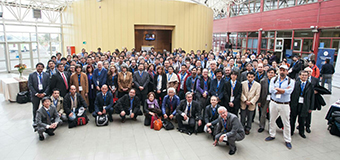The event brought together leading researchers from both countries around the main discoveries, studies and technological advances in matters such as astronomy, telemedicine, marine toxicology, aerospace technology, mining processes, seismology and natural disasters, among other topics.

The international meeting Chile-Japan Academic Forum 2016 was held before a large audience of local, national and foreign audiences, a conclave that between November 7th and 11th, focused the attention of the scientific world in Patagonia.
Conducting more frontier science together, advancing the ties already established and creating new alliances is the objective of this second version of the biannual meeting organized by the University of Tokyo, Universidad Católica de Chile, Universidad de Chile and Universidad de Magallanes, in which participated more than 200 researchers and the main authorities of these schools.
The opening ceremony was held on Monday 7th in the Ernesto Livacic auditorium at Universidad de Magallanes, located in the city of Punta Arenas, and was attended by the Executive Vice President of the University of Tokyo, Ken Furuya; the President of Universidad de Chile, Ennio Vivaldi; the President of Pontificia Universidad Católica de Chile, Ignacio Sánchez; and the President of Universidad de Magallanes, Juan Oyarzo, as well as authorities from the other participating institutions.
The event brought together more than 200 researchers from different parts of the world, with the aim of strengthening ties of knowledge exchange and innovation in a multiplicity of topics of common interest at the local, national, regional and global levels. These subjects were addressed in joint work workshops, between Monday 7th and Friday 11t, in the context of Patagonia as a natural laboratory and scientific heritage of humanity. During these sessions, the main discoveries, studies and technological advances in areas such as astronomy, telemedicine, marine toxicology, aerospace technology, mining processes, seismology and natural disasters, among other topics, were analyzed.
Pontificia Universidad Católica de Chile President, Ignacio Sánchez, meanwhile, highlighted the holding of this scientific meeting in Magallanes “since it is very important to be able to facilitate meeting places so that researchers who are working on their own lines of action can interact and see possibilities of joint work in the different areas of knowledge. For us as a university it is a great opportunity, because I believe that this is the way to make a real internationalization of scientific and cultural knowledge ”.
These meetings were mainly made up of researchers from the organizing Chilean universities and about a hundred Japanese scientists from the University of Tokyo and the University of Tsukuba, among other Japanese institutions. They were joined by specialists from other important institutions, such as the University of Sao Paulo (Brazil) and the Berlin Space Center. Part of the Japanese delegation was also made up of senior executives of Japanese companies such as Toyota, Nippon Telegraph and Telephone Corporation (NTT), Toray Industries, Pan Pacific Copper and JX Nippon Mining & Metals Corp.
The UC Director of Research Affairs Office, María Elena Boisier, revealed the progress made by this forum in terms of strengthening and expanding international cooperation networks. “The activity has been very successful, especially within the framework of the Internationalization Project, since the objective of collaboration between the two most important universities in the country (Universidad de Chile and Universidad Católica) is fulfilled, and of these with a regional and state one, like U. de Magellaness. In addition, research is positioned worldwide together with the University of Tokyo, which is at the forefront in many research topics, and the University of Sao Paulo, which is very important in Latin America ”, she said. On the other hand, he added, “I think it is important to position the region for its tremendous potential in research development. Its status as a natural laboratory and the recent approval of resources for the construction of the Subantarctic Center for Biodiversity are issues that will position the region and Chile worldwide in research issues ”.